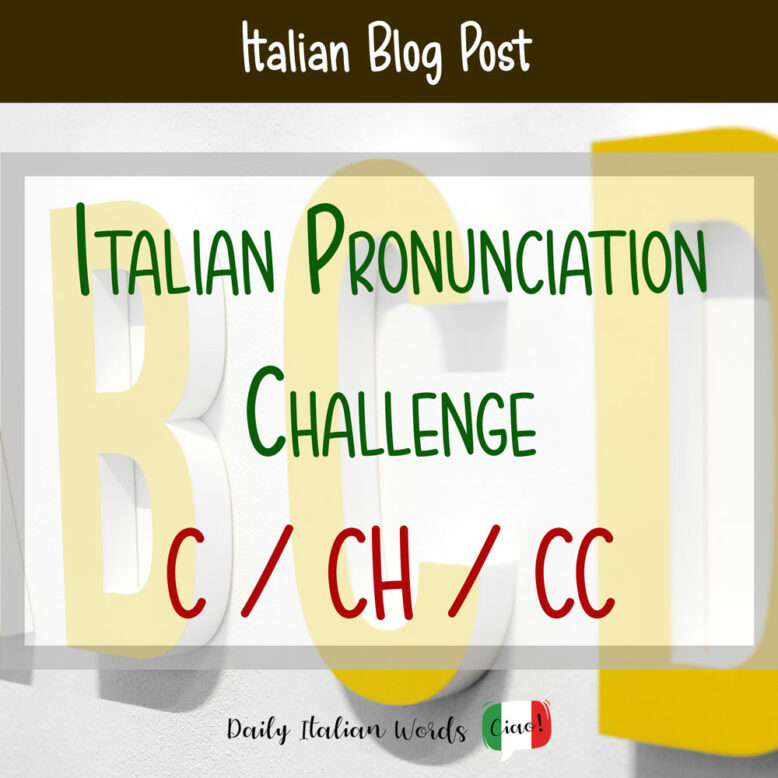Although Italian has gained the reputation of being a “phonetic language” – meaning that there is a direct relationship between the spelling and sounds – there are a few pesky letters that aren’t always pronounced in the same way. One such letter is C.
In today’s article, we’re going to discover the different ways in which the letter C can be pronounced in Italian. Let’s dive straight in! 🙂

The first important rule about the letter C in Italian is that it represents two distinct phonemes in Italian, or in other words, it can be pronounced as a hard or soft sound.
Hard C
IPA symbol: /k/
In Italian, the hard C, which sounds just like the C in car or the K in kite, can be represented by the letters C or CH depending on the vowel that follows. C is used before the vowels A, O and U, while CH appears before the vowels E and I.
- C + A: casa (house), oca (goose)
- C + O: cosa (thing), bianco (white)
- C + U: cucina (kitchen), cucù (cuckoo clock)
- CH + E: anche (also), bruschetta (bruschetta)
- CH + I: chilo (kilo), chimico (chemical)
Casa – Cosa – Cucina – Anche – Chilo
Be aware that if CH + I is followed by another vowel, such as O or A, and they are contained within the same syllable, the letter I becomes a [j] sound, similar to the letter Y in “yes”. For example:
- the CHIO in chiodo (nail) is pronounced KYO, not KEE-OH
- the CHIA in macchia (stain) is pronounced KYA, not KEE-AH
Chiodo – Macchia
If CHI and the following vowel aren’t contained within the same syllable (i.e. anarchia – AN-AR-CHI-A), they are pronounced separately.
If C is followed by another consonant, namely R or L, it is always hard. For example:
Crescita – Cliente – Clima – Croce
Growth – Client – Climate – Cross

Soft C
IPA symbol: /tʃ/
The Italian soft C is represented by a C followed by an E or an I. It sounds exactly like the English CH, as in the words child or chess.
- C + E: cena (dinner), oceano (ocean)
- C + I: cigno (swan), acido (acid)
Cena – Oceano – Cigno – Acido
If C + I is followed by another vowel, such as O or A, and they are contained within the same syllable, the letter I becomes silent. For example:
- the CIO in micio (cat) is pronounced like the CHO in “chosen” (not CHI-OH)
- the CIA in pancia (tummy) is pronounced like the CHA in “chance” (not CHI-AH)
Micio – Pancia
If CI and the following vowel aren’t contained within the same syllable (e.g. farmacia – FAR-MA-CI-A), they are pronounced separately.

Double CC
Sometimes you will encounter words that contain a double CC. To pronounce this double consonant, all you have to do is hold the C a bit longer than you normally would, almost as if you were taking a very brief pause before finishing the word. Have a listen to the examples below:
Cuccia – Cucchiaio – Macchina – Accipicchia!
Dog basket – Spoon – Car/Machine – Gosh!

What about SC words?
The presence of an S before the letter C can influence its pronunciation. More precisely, if S comes before the soft CI or CE, the pronunciation of SC becomes [ʃ] like the SH in the English word “sheep”.
Scienza – Pesci – Scegliere – Scena
Science – Fish – To choose – Scene
If SHI and the following vowel are contained within the same syllable, then the I becomes silent (e.g. sciarpa – SHAR-PA). If they aren’t, the I is clearly pronounced (e.g. sciare – SCI-A-RE).
Sciarpa – Sciare
Scarf – To ski
Loanwords with C
The pronunciation of loanwords, or words adopted from another foreign language, can vary in Italian. More often than not, however, the original pronunciation of the C is preserved, as in the case of the French imports cyclette and chic, and the English check-in and chewing gum.
Heather Broster is a graduate with honours in linguistics from the University of Western Ontario. She is an aspiring polyglot, proficient in English and Italian, as well as Japanese, Welsh, and French to varying degrees of fluency. Originally from Toronto, Heather has resided in various countries, notably Italy for a period of six years. Her primary focus lies in the fields of language acquisition, education, and bilingual instruction.


